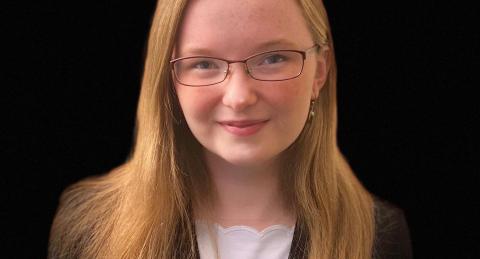
Hometown:
Colebrook, Conn.
What made you choose UNH?
I attended a summer camp at UNH for several years during high school called the Future Leaders Institute. The camp was led by the amazing professors Nick Smith of philosophy and Scott Smith of classics and focused on the philosophic and classical background to different current events. For two weeks we learned and discussed difficult topics in an open and welcoming environment where all of us could learn from each other. The other campers and UNH students that were TA’s became my close friends, and Professor Nick Smith and Scott Smith became my close mentors. I loved my time at the Future Leaders Institute and wanted nothing more to continue the wonderful experiences I had at UNH in my undergraduate career.
How did you choose your major and why?
Throughout high school I participated in Model United Nations and debated competitively. Many of my interests were focused on the political realm. However, to me, politics is much more than the events that appear in the news or in our textbooks. Politics is about human psychology, philosophy, morality and often has foundations in classical ideas. As such, when deciding on my major I wanted to not only learn about politics, but also learn about the philosophical ideas that impact the political world and the classical background of these ideas. Thus, the interest in my majors and minor (classics) was born. After reflecting back on my time at UNH, the interdepartmental nature of my academic experience has been one of the factors that has enriched my education the most.
What do you enjoy most about being in the College of Liberal Arts?
I think that one of the best parts about being a member of the College of Liberal Arts is how it combines all the benefits of a small liberal arts college environment with the advantages of being a part of a larger university. The College of Liberal Arts is very interconnected. It does not take long to feel like you are a part of the community and to develop interpersonal relationships with students and faculty alike throughout the college. As part of the larger UNH community I am also able to take advantage of amazing opportunities such as student research grants, study abroad opportunities and learning from ideas from different colleges that I would not be exposed to in the College of Liberal Arts.
Have you undertaken any experiential learning (internships, study abroad, research, etc.)?
One of my favorite experiences at UNH was studying abroad in Rome in January of 2020 with Professor Scott Smith of the classics program. Being able to be in Rome with a classics professor who shared his knowledge with us throughout every museum tour, monument and ruin was an incredible experience. It is one thing to learn about antiquity in the classroom, but to be in the city where so many important historical events occurred was a whole new experience. Not only did I learn an incredible amount while in Rome, but I also gained friendships, learned about Italian culture and made it a goal to eat gelato everyday (which I highly recommend).
Are you involved in any groups, clubs or organizations?
In my first semester at UNH I was searching to find an organization that I could be part of that sought to have productive conversations about important issues, different than the combative style of debating that I participated in in high school. I found exactly that in the Civil Discourse Lab (CDL). The CDL seeks to create meaningful conversations on important issues that are facilitated by trained students that guide productive discussions. As part of the CDL I have organized and facilitated events on sensitive issues such as the Israel Palestine conflict, opioid addiction and access to higher education. My experiences at these events taught me the value of the CDL. I have seen people’s perspectives change, a group become aware of the existence and viewpoint of other groups, helped different sides find common ground and watched people from diverse backgrounds discuss societal issues that affect everyone, all in one thoughtful conversation.
How is COLA preparing you for career and professional success?
I think that one of the most important skills I have learned at COLA is critical thinking. No matter what profession you are in, critical thinking is always an important skill to have, even just to be an informed voter! Being able to critically think about the who, what, when, where, and why behind everything is such an important skill that takes time and practice to develop. The College of Liberal Arts has definitely helped improve my critical thinking skills by exposing me to many different ideas that have broadened my perspective, while also helping me develop techniques to evaluate these ideas with.
What are your post-graduation plans at this point?
Next year I will be attending the University of New Hampshire Franklin Pierce School of Law to study public interest law. I hope to spend my time there studying how the law impacts important social issues and hopefully begin to build a career where I can make a difference on behalf of marginalized groups.
What is one thing people might be surprised to learn about you?
I was homeschooled in high school while also attending a local community college. UNH was great about accepting my community college credits, which allowed me to focus my education on the courses I was personally interested in and to graduate early.